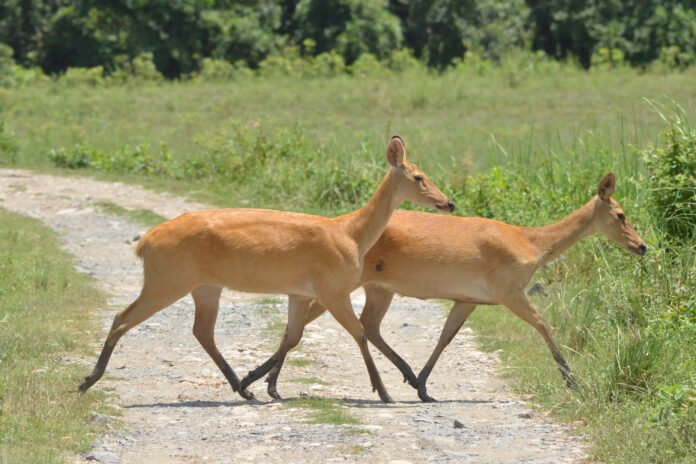In a heartening display of community vigilance and compassion, locals in Barghuli Number 3, Assam, recently rescued a deer that had strayed from Kaziranga National Park. The incident occurred as the deer wandered into human settlements, likely in search of food amid the challenges posed by its natural habitat.
Kaziranga National Park, renowned for its biodiversity and home to a significant population of endangered species like the Indian rhinoceros and Bengal tiger, often faces wildlife-human conflict scenarios due to habitat fragmentation and food scarcity. The deer’s straying highlights the pressing issue of wildlife encountering challenges beyond the protected park boundaries.
Locals acted swiftly upon spotting the distressed deer, recognizing the importance of ensuring its safe return to its natural habitat. Such incidents underscore the need for heightened vigilance and prompt reporting of wildlife sightings to wildlife authorities. This proactive approach not only safeguards the welfare of animals but also promotes coexistence between communities and the rich wildlife of the region.
Authorities from Kaziranga National Park have appreciated the swift action taken by the residents of Barghuli Number 3, emphasizing the crucial role of community involvement in wildlife conservation efforts. Efforts to mitigate human-wildlife conflicts and protect the natural habitats of Kaziranga’s diverse fauna remain ongoing priorities for conservationists and local authorities alike.
The incident serves as a reminder of the delicate balance required to ensure the safety and preservation of wildlife in regions like Kaziranga National Park, where habitat conservation and community awareness play pivotal roles. As Assam continues to grapple with wildlife challenges exacerbated by environmental changes and human activities, collective efforts to protect and support the region’s natural heritage become increasingly vital.
The successful rescue of the deer highlights not only the resilience of Kaziranga’s ecosystem but also the dedication of local communities to uphold wildlife conservation principles. It reinforces the importance of proactive measures and community participation in safeguarding the region’s precious biodiversity.
As efforts continue to strengthen wildlife protection initiatives across Assam, incidents like these underscore the imperative of maintaining harmony between humans and wildlife, ensuring a sustainable future for both.


